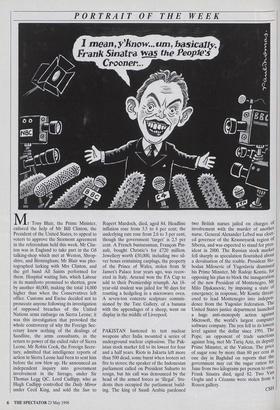PORTRAIT OF THE WEEK
Mr Tony Blair, the Prime Minister, enlisted the help of Mr Bill Clinton, the President of the United States, to appeal to voters to approve the Stormont agreement in the referendum held this week. Mr Clin- ton was in England to take part in the G8 talking-shop which met at Weston, Shrop- shire, and Birmingham; Mr Blair was pho- tographed larking with Mrs Clinton, and the girl band All Saints performed for them, Hospital waiting lists, which Labour in its manifesto promised to shorten, grew by another 40,000, making the total 14,000 higher than when the Conservatives left office. Customs and Excise decided not to prosecute anyone following its investigation of supposed breaches of the United Nations arms embargo on Sierra Leone; it was this investigation that provoked the whole controversy of why the Foreign Sec- retary knew nothing of the dealings of Sandline, the arms consultants, in the return to power of the exiled ruler of Sierra Leone. Mr Robin Cook, the Foreign Secre- tary, admitted that intelligence reports of action in Sierra Leone had been to sent him before the row blew up. He announced an independent inquiry into government involvement in the farrago, under Sir Thomas Legg QC. Lord Cudlipp, who as Hugh Cudlipp controlled the Daily Mirror under Cecil King, and sold the Sun to Rupert Murdoch, died, aged 84. Headline inflation rose from 3.5 to 4 per cent; the underlying rate rose from 2.6 to 3 per cent, though the government 'target' is 2.5 per cent. A French businessman, Francois Pin- ault, bought Christie's for £720 million. Jewellery worth £50,000, including two sil- ver boxes containing earplugs, the property of the Prince of Wales, stolen from St James's Palace four years ago, was recov- ered in Italy. Arsenal won the FA Cup to add to their Premiership triumph. An 18- year-old student was jailed for 90 days for roasting a hedgehog in a microwave oven. A seven-ton concrete sculpture commis- sioned by the Tate Gallery, of a banana with the appendages of a sheep, went on display in the middle of Liverpool.
PAKISTAN hastened to test nuclear weapons after India mounted a series of underground nuclear explosions. The Pak- istan stock market fell to its lowest for four and a half years. Riots in Jakarta left more than 500 dead, some burnt when looters set fire to stores; the speaker of the Indonesian parliament called on President Suharto to resign, but his call was denounced by the head of the armed forces as 'illegal'. Stu- dents then occupied the parliament build- ing. The king of Saudi Arabia pardoned two British nurses jailed on charges of involvement with the murder of another nurse. General Alexander Lebed was elect- ed governor of the Krasnoyarsk region of Siberia, and was expected to stand for pres- ident in 2000. The Russian stock market fell sharply as speculation flourished about a devaluation of the rouble. President Slo- bodan Milosevic of Yugoslavia dismissed his Prime Minister, Mr Radoje Kontic, for opposing his plan to block the inauguration of the new President of Montenegro, Mr Milo Djukanovic, by imposing a state of emergency; in response, Mr Kontic threat- ened to lead Montenegro into indepen- dence from the Yugoslav federation. The United States justice department launched a huge anti-monopoly action against Microsoft, the world's largest computer software company. The yen fell to its lowest level against the dollar since 1991. The Pope, an opponent of trade sanctions against Iraq, met Mr Tariq Aziz, its deputy Prime Minister, at the Vatican. The price of sugar rose by more than 80 per cent in one day in Baghdad on reports that the government may cut the sugar ration for June from two kilograms per person to one- Frank Sinatra died, aged 82, Two Van Goghs and a Cezanne were stolen from a Rouen gallery, CSI4


































































 Previous page
Previous page